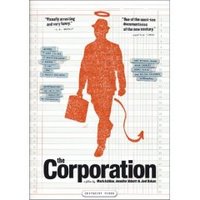
The documentary film, “The Corporation” starts out reasonable enough, touching on the history of the modern corporation, but quickly devolves into a socialist diatribe on all the “evils” of capitalism. The film is essentially a list of categories of bad things corporations have done (or allegedly done), peppered throughout with the opinions of the likes of Michael Moore and Noam Chomsky. “Balance” comes through what appear to be highly edited clips of Milton Friedman and an advocate of private property (gasp!).
The film begins with the evolution of the modern corporation in the industrial age, describing laws that established corporations as the equivalent of an “individual” in society with the rights to buy and sell property, borrow money, and sue people under the law. As part of the definition of a corporation, the film offers “externalities,” as a basic characteristic and fact of corporate life, that is – an entity that engages in agreements between two parties that then pushes as much work or external burden on an unwary third party (presumably the public).
The film makers then go on to ask, “well if the corporation is a person, what type of person would it be?” What follows is an almost laughable case for why the corporation possesses all of the characteristics of a psychopathic person, going through a checklist of bad behavior traits that purportedly describe corporate deviance. The producers go so far as to bring in a “FBI profiler” who tells us that corporations do indeed posses all the personality traits of a psychopath. Milton Friedman thankfully points out that while corporations may not have a soul per se, it is the people who run that company that provide it’s moral compass (paraphrasing).
Then “The Corporation” runs through every corporate scandal in history, from pollution, to bad chemicals, to smoking, to accounting scandals, to sweat shops and even dips into IBM’s alleged aide to the Nazi’s as part of the Holocaust. We’re told that corporations only have one thing, the bottom line, and according to Michael Moore, the “problem comes in the profit motive.”
In fact, if I had to sum up the whole movie it would be just that, “an attack on the profit motive.” Not one shred of argument is given to the literally billions of benefits mankind enjoys due solely to man’s pursuit of profit (when is the last time you tried to grow your own apples? Build your own combustion engine? Concoct your own heart medicine?) No, instead the “reformed” CEO of a carpet company, Interface, explains that “every living system on the Earth is in decline,” that, “no scientific paper in the past thirty years would contradict” this, and that it is man’s pursuit short term profits that is to blame. He goes on to “confess” that “I have been running Interface like a plunderer – some day they’ll put people in jail for that.”
This movie is fodder for the easily swayed, simple minded folk. “Proof” that corporations and the profit motive is evil comes in many forms. We’re given Mark Barry, author of “Spooked: Espionage in Corporate America,” who declares “I am a spy,” and tells of a National Security Agency meeting that has people from major corporations attending (gasp!). We’re given a “trader” who’s name I didn’t pick up who tells us the first thing that “every” trader thought just minutes after the September 11th attacks was, “the price of gold will soar!”
One after another we’re given reason to hate “the man.” Certainly some have merit in that they were the “bad apples” the film mocks. For many others, they’re backed up with the loosest of “facts” and philosophic opinions. Curiously, the film takes the wind out of its own sails when the major proponent against child labor in the third world (a good thing of course!) declares when speaking of The GAP – “you can still reach these companies – you can still have an effect!” Some of us would point out that shaming a company into doing the right thing is A- good business, and B- part of the “market forces” that these people so deride.
Michael Moore (who else) helps us fade to black with thoughts on the irony of his own claim to fame. He points out that he himself is distributed and in fact promoted by large corporations. Why? Why would they do that he asks? It’s the “greed flaw” he tells us, “they don’t believe in anything.” Mostly I picture this film’s target market saying “yeah. Yeah man, they don’t believe in anything!” I wonder if that same person will stop to ponder the part of the “greed factor” that made Michael Moore independently wealthy. Is he just exempt from that?
Watch it if you will, but I find it’s arguments pathetically lacking. Certainly there are many examples (endless?) of people as part of corporations committing immoral and illegal acts. However, is it at a hirer rate than individuals acting in this manner? Malfeasance should be pursued, investigated, prosecuted, and punished; however, the corporation itself is not evil. Corporations today provide one vehicle for millions upon millions of people to serve and be served by their fellow man. Further, they are motivated by the “profit motive” (as would an individual on his own), which in turn can be invested to grow capacity for further service.
The film begins with the evolution of the modern corporation in the industrial age, describing laws that established corporations as the equivalent of an “individual” in society with the rights to buy and sell property, borrow money, and sue people under the law. As part of the definition of a corporation, the film offers “externalities,” as a basic characteristic and fact of corporate life, that is – an entity that engages in agreements between two parties that then pushes as much work or external burden on an unwary third party (presumably the public).
The film makers then go on to ask, “well if the corporation is a person, what type of person would it be?” What follows is an almost laughable case for why the corporation possesses all of the characteristics of a psychopathic person, going through a checklist of bad behavior traits that purportedly describe corporate deviance. The producers go so far as to bring in a “FBI profiler” who tells us that corporations do indeed posses all the personality traits of a psychopath. Milton Friedman thankfully points out that while corporations may not have a soul per se, it is the people who run that company that provide it’s moral compass (paraphrasing).
Then “The Corporation” runs through every corporate scandal in history, from pollution, to bad chemicals, to smoking, to accounting scandals, to sweat shops and even dips into IBM’s alleged aide to the Nazi’s as part of the Holocaust. We’re told that corporations only have one thing, the bottom line, and according to Michael Moore, the “problem comes in the profit motive.”
In fact, if I had to sum up the whole movie it would be just that, “an attack on the profit motive.” Not one shred of argument is given to the literally billions of benefits mankind enjoys due solely to man’s pursuit of profit (when is the last time you tried to grow your own apples? Build your own combustion engine? Concoct your own heart medicine?) No, instead the “reformed” CEO of a carpet company, Interface, explains that “every living system on the Earth is in decline,” that, “no scientific paper in the past thirty years would contradict” this, and that it is man’s pursuit short term profits that is to blame. He goes on to “confess” that “I have been running Interface like a plunderer – some day they’ll put people in jail for that.”
This movie is fodder for the easily swayed, simple minded folk. “Proof” that corporations and the profit motive is evil comes in many forms. We’re given Mark Barry, author of “Spooked: Espionage in Corporate America,” who declares “I am a spy,” and tells of a National Security Agency meeting that has people from major corporations attending (gasp!). We’re given a “trader” who’s name I didn’t pick up who tells us the first thing that “every” trader thought just minutes after the September 11th attacks was, “the price of gold will soar!”
One after another we’re given reason to hate “the man.” Certainly some have merit in that they were the “bad apples” the film mocks. For many others, they’re backed up with the loosest of “facts” and philosophic opinions. Curiously, the film takes the wind out of its own sails when the major proponent against child labor in the third world (a good thing of course!) declares when speaking of The GAP – “you can still reach these companies – you can still have an effect!” Some of us would point out that shaming a company into doing the right thing is A- good business, and B- part of the “market forces” that these people so deride.
Michael Moore (who else) helps us fade to black with thoughts on the irony of his own claim to fame. He points out that he himself is distributed and in fact promoted by large corporations. Why? Why would they do that he asks? It’s the “greed flaw” he tells us, “they don’t believe in anything.” Mostly I picture this film’s target market saying “yeah. Yeah man, they don’t believe in anything!” I wonder if that same person will stop to ponder the part of the “greed factor” that made Michael Moore independently wealthy. Is he just exempt from that?
Watch it if you will, but I find it’s arguments pathetically lacking. Certainly there are many examples (endless?) of people as part of corporations committing immoral and illegal acts. However, is it at a hirer rate than individuals acting in this manner? Malfeasance should be pursued, investigated, prosecuted, and punished; however, the corporation itself is not evil. Corporations today provide one vehicle for millions upon millions of people to serve and be served by their fellow man. Further, they are motivated by the “profit motive” (as would an individual on his own), which in turn can be invested to grow capacity for further service.



No comments:
Post a Comment